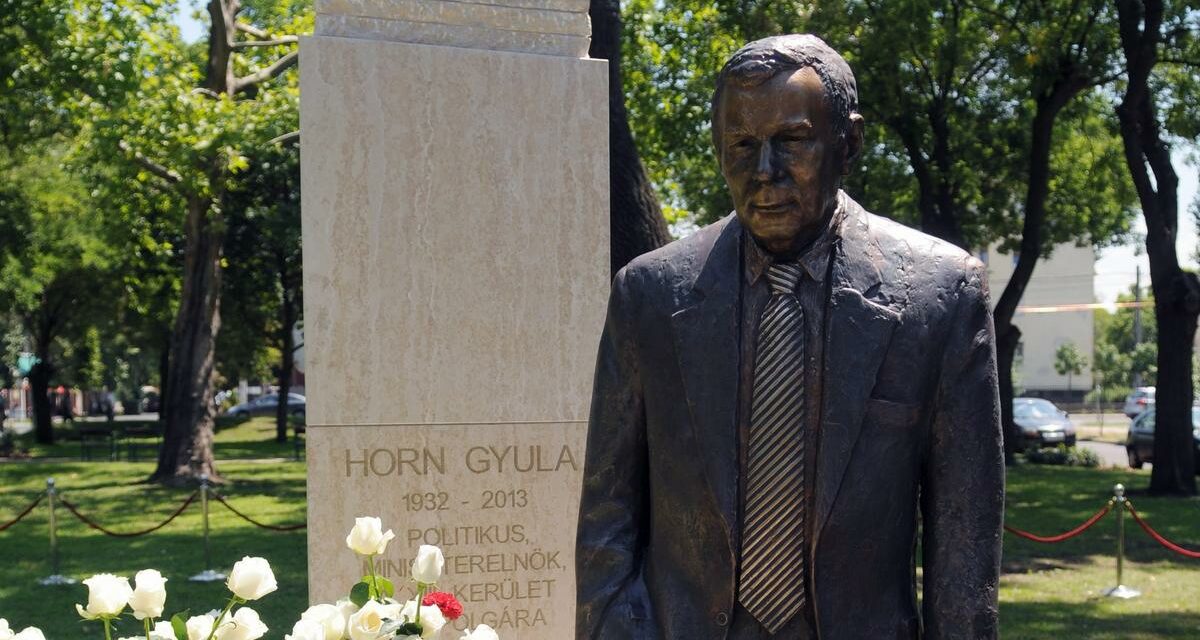The law states that public land and public institutions owned by municipalities cannot bear the name of a person who, in the XX. participated in the foundation, construction or maintenance of autocratic political systems in the 19th century.
Gyula Horn was indisputably and clearly involved in the foundation of an autocratic system, namely the communist dictatorship - as he helped to crush the revolution as a pufferfish, thus establishing the second stage of the dictatorship, the Kádár system, and participating in the maintenance of the latter - so his name cannot be used on public land .
However, if a municipal body nevertheless decides to name a promenade after Gyula Horn, it is breaking the law.
This was pointed out by the Metropolitan Government Office led by the mayor Sára Botond, and called on the municipal government, but to no avail. After several unsuccessful attempts, they made a legal appeal to the capital to eliminate the illegal situation and delete the name of the Horn Gyula Promenade.
At its most recent meeting, however, the Metropolitan Assembly "casually" decided not to comply with the call for legality and not to change the name of the promenade.
I will not go into further details - since I already wrote about them, including the clever campaign of Zoltán Felföldi, in our paper (Are we serious now or are we joking about the regime change?, March 29).
The good news is that the Capital City Government Office did not leave it at that and is going to court regarding the capital's completely illegal action.
This is the only correct procedure. The capital led by Gergely Karácsony - and of course Ferenc Gyurcsány in the background - should not and cannot be allowed to ignore the legislation.
I see this issue as a key issue, in which the national side must be as hard as concrete.
The moral stakes are high here, two questions are at stake at the same time: will we protect the spirit of the regime change, and on the other hand, will we protect the rule of law in Hungary?
Because we have something to make up for: the change of regime in Hungary took place in such a way - it's good if the young people know this - that essentially not a single member of the political elite controlling the dictatorship had a single hair curled, but they didn't even really face moral condemnation. Between 1989 and 1994, the regime change in Hungary took place - from a personal point of view - as if nothing had happened, the Antall government replaced the Németh government, period. The high-profile audience - preferably the citizens - could only perceive that the composition of the government had changed, but everyone else from the pro-state period remained in place, and a huge economic crisis developed in the country, one and a half million people lost their jobs.
The Hungarian regime change took place in such a way that the dreaded head of the ÁVÓ, Gábor Péter, who tortured the masses of people at Andrássy út 60, and in many cases to death, died in 1993, without any accountability, in bed and among pillows.
The Hungarian regime change took place in such a way that József Antall entrusted the reorganization of the secret services to Szilveszter Galambos and his partner, who was the head of the dreaded III/III internal countermeasures department. (Galambos also died in bed and between pillows in 2002, while the names of agents recruited by coercion and blackmail, who never report to anyone, with an unfortunate fate are still being thrown around today.)
The Hungarian regime change took place in such a way that Béla Biszku, who played a leading role in the execution of the revolutionaries in 1956, could somehow be brought to court thanks to a complete coincidence and Fruzsina Skrabski's tricky interview, but it was already too late.
And the Hungarian regime change took place in such a way that the privatization of the national wealth was led and managed by Lajos Csepi, who held a leading position in the KISZ.
And the Hungarian regime change took place in such a way that Gyurcsány was able to get the government resort in Ószöd in a tricky and essentially free way, by making an agreement with György Szilvássy as the deputy state secretary of the Boross government at the time, with whom he worked as a leader in the KISZ.
I won't continue because why not.
I'm just saying: we have something to make up for.
The capital city is bleeding from a thousand wounds, they are incompetent, corrupt and lie, but they are also lawbreakers, since they want to illegally name a promenade after a communist.
If we don't stand up now, we never will.
And if the Capital Assembly continues to act unlawfully, it must be dissolved.
Dixie!
Source: Hungarian Nation
Photo: MTI-Honéczy Barnabás












